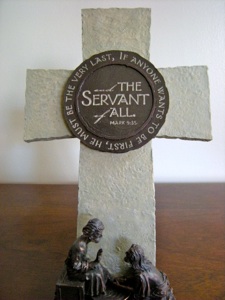Some Faith Perspectives

Some Faith Perspectives
Hear one voice speaking through Isaiah and Robert Greenleaf. Hear the servant respond, "Here am I; send me." Hear the challenge to transform institutions.
Hear A Call to Servant-Leadership
in the Judaeo-Christian Tradition
Helpful Gifts

I try each day to live out my vocation consistent with the commitment below. While I do this out of a Christian conviction, I believe that God engages our hearts in many ways and through many traditions. I hope visitors to this site from other faith traditions will feel welcome and will be led to contribute how their tradition informs and nurtures the practice of servant-leadership.
A Personal Vocational Commitment
I seek to truly integrate my vocation with who I am as a person and my spiritual grounding as a Christian. I seek to act as a servant-leader to help reform societal institutions. This is the focus around which my activities as a civic entrepreneur and shepherd are centered. I try to help others to discover and recover the animating spirit which motivates and guides them in their life and work. I help leadership communities develop the vision and mission of their institutions of work that are created to serve the world.
- James S. Emrich
A Place of Inquiry and Conversation
For a fresh and provocative conversation about faith in our personal and communal lives you will want to visit Speaking of Faith with Krista Tippett.
Servant-Leadership and Christian Scripture
As I have been praying and reflecting about Christian Servant--Leadership over the last several years, several passages from scripture have spoken to my heart. Please see Scripture and Servant-Leadership by clicking here.
Transformation and Romans 12
Eugene Peterson in his contemporary translation of Romans 12 (The Message) speaks powerfully of what it means to not be conformed to the culture of the world. Please see Romans 12 by clicking here.
Servant-Leadership and Getting Lost
"We want a guide who only has at heart our getting lost! This is the ground on which the greatest religious traditions of the world have always stood. The tradition built around the ministry of Jesus of Nazareth, the one in which I grew up and which has the greatest symbolic meaning to me now, seems especially emphatic on this point. Jesus seemed only to have at heart our getting lost; he was concerned with what must be taken away rather than what was gained." So wrote Robert Greenleaf in 1963, six years before he authored his seminal article on servant‐leadership. In my heart, I know that Bob has spoken a deep truth. Servant‐leadership, at its best, is grounded in the soil of authentic religion. It is not a secular concept. It is also about getting lost, laying aside the conventional wisdom as a guide to how we should be and act in the world. Please see Leadership In In by clicking here.

Dr. Martin Luther King, Jr. was born in 1929 and died tragically in 1968. In his brief 39 years with us he embodied the life of a prophet speaking to the often silent conscience of our country. He named evil, stood firmly against it and yet embraced a style of leadership which was both confrontational and non-violent. No leader, in our time, has more faithfully embodied servant-leadership. Read More
Simple Gifts
It can happen to anyone, at any time. It happened to me in a quiet morning hour, after a contemplative time, not long out of sleep and not yet busy. The tune came into me and out as a joyous whistle spontaneously. What was it?
Slowly, I remembered it, as a melody in Aaron Copland's Appalachian Spring. Soon, I found the words, written by Shaker Elder Joseph Brackett a century and a half ago, titled Simple Gifts. Please see Simple Gifts by clicking here.
A Possible Theological Context
How might one begin to understand reformation and transformation and their theological relationship to servant-leadership. Please see the graphic by clicking Three Fold Valley Romans Jones.pdf.

St. Francis was a sower of love and an instrument of peace. May his simple, yet powerful, words speak to our broken and hurting world.

Dr. Howard Thurman was born in 1900 and died in 1981. As black man growing up in the South in the early part of this century he encountered racism in its most raw form. Raised by his mother and grandmother he was taught to "lean on the Lord." From these roots he entered on a distinguished career in ministry and also become a noted author. A spiritual companion to many, he particularly raised up the good news of Jesus' mission to the disinherited. Read More To visit the Thurman Papers project, please cliek here. To visit the Thurman video project, please click here. To hear selected Thurman recordings, please click here

Jean Vanier was born in Canada in 1928 and is still living. After serving several years in the British and Canadian Royal Navies, he resigned to pursue a doctorate in Philosophy. In 1964, he and two men with developmental disabilities founded L'Arche, an intentional community, in France. Since then, 103 more such communities have been created throughout the world. At this stage in his life he has a world-wide ministry. He has written extensively about his experience in community building. The following quotes are taken from his book, Community and Growth. I urge you to give yourself the gift of purchasing this book. Read More

Clive Staples Lewis was born in 1898 and died in 1963. He was a critic, scholar, and novelist. A professed atheist, he had a conversion to Christianity in mid-life. Read More

Henri Nouwen's books are widely read today by Protestants and Catholics alike. The Wounded Healer, In the Name of Jesus, Clowning in Rome, The Life of the Beloved and The Way of the Heart are just a few of the more widely recognized titles. After nearly two decades of teaching at the Menninger Foundation Clinic in Topeka, Kansas, and at the University of Notre Dame, Yale University and Harvard University, he went to share his life with mentally handicapped people at the L'Arche community of Daybreak in Toronto, Canada. He died in September 1996 from a sudden heart attack. Read More

St. Benedict (480-547) lived in the sixth century in Italy during the disintegration of the Roman Empire. As a young man he sought the solitude of living in a cave where he underwent a deep religious experience. In time, with some disciples he came to found a monastery some eighty miles south of Rome. Benedict created a "little rule for beginners," which contained directions for all aspects of monastic life. Included in this rule is an explication of the qualities of the Abbot (Chapter 2). Listen carefully to what Benedict had to say some 1500 years ago and ponder how much might still be true today. This rule remains central to how Benedictine monasteries are governed and led in our time. Read More

Joan Chittister, OSB, Erie, Pennsylvania, U.S.A., is a social psychologist, international lecturer, and author of over twenty books. A member of the Benedictine Sisters of Erie she is the executive director of Benetvision: A Resource and Research Center for Contemporary Spirituality. She is a past president of the Conference of American Benedictine Prioresses and the Leadership Conference of Women Religious and has taught on all educational levels. She is a world renowned expert in Benedictine Spirituality in Religious and secular life. Website or Read More

Father Buckley addressed a community of priests in training on the occasion of the completion of their work at the Jesuit School of Theology at Berkeley. He posed a very fundamental question and yet one at variance to the conventional wisdom of our day. He asked his young colleagues, not if they were strong enough for their vocation, but if they were weak enough. Listen with wonder as his audience must have at that time. The Wisdom of Rev Michael J Buckley.pdf

Desmond Mpilo Tutu (born 7 October 1931) is a South African cleric and activist who rose to worldwide fame during the 1980s as an opponent of apartheid. In 1984, Tutu became the second South African to be awarded the Nobel Peace Prize. Tutu was the first black South African Anglican Archbishop of Cape Town, South Africa, and primate of the Church of the Province of Southern Africa (now the Anglican Church of Southern Africa). Tutu chaired the Truth and Reconciliation Commission and is currently the chairman of The Elders. Tutu is vocal in his defense of human rights and uses his high profile to campaign for the oppressed. Tutu also campaigns to fight AIDS, homophobia, poverty and racism. He received the Nobel Peace Prize in 1984, the Albert Schweitzer Prize for Humanitarianism, and the Gandhi Peace Prize in 2005.[1] Tutu has also compiled several books of his speeches and sayings. Read More

John Woolman was born at Northampton, N. J., in 1720, and died at York, England, in 1772. He Was the child of Quaker parents, and from his youth was a zealous member of the Society of Friends. His "Journal," published posthumously in 1774, sufficiently describes his way of life and the spirit in which he did his work; but his extreme humility prevents him from making clear the importance of the part he played in the movement against slaveholding among the Quakers.
During the earlier years of their settlement in America, the Friends took part in the traffic in slaves with apparently as little hesitation as their fellow colonists; but in 1671 George Fox, visiting the Barbados, was struck by the inconsistency of slave-holding with the religious principles of his Society. His protests, along with those of others, led to the growth of an agitation which spread from section to section. In 1742, Woolman, then a young clerk in the employment of a storekeeper in New Jersey, was asked to make out a bill of sale for a negro woman; and the scruples which then occurred to him were the beginning of a life-long activity against the traffic. Shortly afterward he began his laborious foot-journeys, pleading everywhere with his co-religionists, and inspiring others to take up the crusade. The result of the agitation was that the various Yearly Meetings one by one decided that emancipation was a religious duty; and within twenty years after Woolman's death the practice of slavery had ceased in the Society of Friends. But his influence did not stop there, for no small part of the enthusiasm of the general emancipation movement is traceable to his labors.
His own words in this "Journal" of an extraordinary simplicity and charm, are the best expression of a personality which in its ardor, purity of motive, breadth of sympathy, and clear spiritual insight, gives Woolman a place among the uncanonized saints of America. Read More

In 1984, Dick Broholm met with Robert Greenleaf and soon became the part-time staff for the Center For Applied Studies (predecessor to the Greenleaf Center), a role he served alongside his responsibilities with the Center for the Ministry of the Laity at Andover-Newton Seminary. One outgrowth of the arrangement was the formation, at the encouragement of Robert Greenleaf, of a learning community focussing on the exploration of a theology of institutions. Dick has written a powerful reflection on the history of this work. Read More
Isa. 6:5 - 8 And I said: "Woe is me! I am lost, for I am a man of unclean lips, and I live among a people of unclean lips; yet my eyes have seen the King, the LORD of hosts!"
Then one of the seraphs flew to me, holding a live coal that had been taken from the altar with a pair of tongs. The seraph touched my mouth with it and said: "Now that this has touched your lips, your guilt has departed and your sin is blotted out."
Then I heard the voice of the Lord saying, "Whom shall I send, and who will go for us?" And I said, "Here am I; send me!"
If a better society is to be built, one more just and more caring and providing opportunity for people to grow, the most effective and economical way, while supportive of the social order, is to raise the performance as servant of as many institutions as possible by new voluntary regenerative forces initiated within them by committed individual servants.
Robert K. Greenleaf.
Come; abide with servant-leadership in a faith perspective for awhile. Learn from it and contribute to it.


Servant-Leader Associates 510 Westminster Avenue Swarthmore, PA 19081
610.544.1031 servantleader1 at me.com


